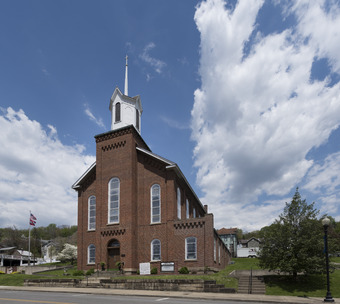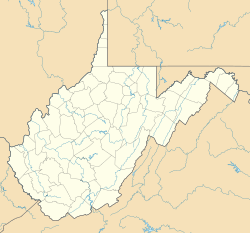International Mother's Day Shrine facts for kids
|
Andrews Methodist Episcopal Church
|
|
 |
|
| Location | 11 E. Main St., Grafton, WV |
|---|---|
| Area | 1 acre (0.40 ha) |
| Built | 1873 |
| Architect | Phillips and Anderson |
| Architectural style | Romanesque |
| NRHP reference No. | 70000667 |
Quick facts for kids Significant dates |
|
| Added to NRHP | December 18, 1970 |
| Designated NHL | October 5, 1992 |
The Andrews Methodist Episcopal Church is a very special place. It's known as the "mother church" of Mother's Day. On May 15, 1962, it became the International Mother's Day Shrine. This shrine honors all mothers around the world.
This church is famous because Anna Jarvis first thought of the idea for Mother's Day here. It is located on Main Street in downtown Grafton. Grafton is a town in Taylor County, West Virginia.
The church building is named after Edward Gayer Andrews. He was a bishop in the Methodist Episcopal Church. Bishop Andrews led the church's dedication service on March 16, 1873. The International Mother's Day Shrine was named a National Historic Landmark on October 5, 1992. This means it's a very important historical place in the United States. The shrine holds a Mother's Day service every year. You can also visit it by making an appointment. It is also used for weddings and group tours.
The Church's Dedication
The Andrews Methodist Episcopal Church was dedicated to Bishop Edward Gayer Andrews. He was a bishop of the Methodist Episcopal Church. He led the special dedication service on March 16, 1873. In 1903, beautiful stained glass windows were added to the church. These replaced the plain windows that were there when it was built. The chancel (the area around the altar) has Christian sacred art by George Blaney. This art shows the "Agony in the Garden of Gethsemane."
How Mother's Day Started
The Andrews Methodist Episcopal Church is most famous for holding the first official Mother's Day celebration. This happened in 1908. Anna Jarvis, who started Mother's Day, wanted to honor "a mother's private service to her family." She wanted Mother's Day to be a special way to remember her own mother, Ann Maria Reeves Jarvis. Anna's mother had passed away in 1905.
After the first celebrations in 1908 in Grafton, West Virginia, and Philadelphia, Pennsylvania, Anna's idea quickly became popular. Anna Jarvis worked hard to make Mother's Day an official holiday. She chose the second Sunday in May for the holiday each year. This date was special because it was the anniversary of her mother's death in 1908. The white carnation became the symbol of the day. Anna chose it because it was her mother's favorite flower.
The celebration of Mother's Day spread to many other countries very quickly. In 1914, President Woodrow Wilson made a special announcement. He said that flags should be flown "on the second Sunday in May." This was to show "our love and respect for the mothers of our country." President Wilson's announcement in 1914 was a big win for Anna Jarvis. It officially recognized her holiday and honored mothers across America. The year 2014 marked 100 years since Wilson's announcement. The International Mother's Day Shrine in Grafton, West Virginia, held special events to celebrate this anniversary.
Mother's Day Around the World
Mother's Day quickly became popular in other countries. By 1909, when Anna Jarvis called for the third Mother's Day celebration, many places joined in. "Forty-five states, Puerto Rico, Hawaii, Canada, and Mexico" celebrated on the second Sunday in May. Anna Jarvis was surprised by how fast other nations adopted Mother's Day. She said, "Where it will end must be left for the future to tell. That it will girdle the globe seems now certain." She believed Mother's Day would be celebrated all around the world.
In May 1932, Mother's Day was even adopted in Japan. This happened after Christians there had observed it for 19 years. This shows how far Anna Jarvis's idea reached. It also shows how Mother's Day was embraced internationally. The worldwide spread of Mother's Day makes the Shrine in Grafton even more connected to people everywhere.
See also
 | William L. Dawson |
 | W. E. B. Du Bois |
 | Harry Belafonte |



